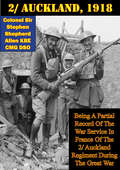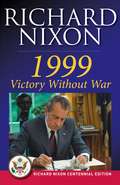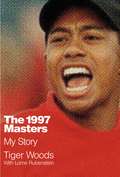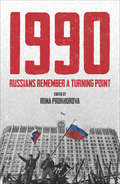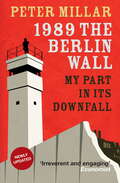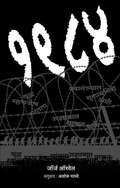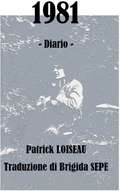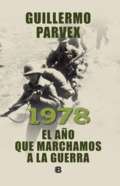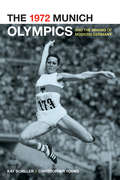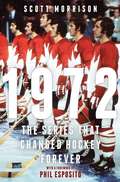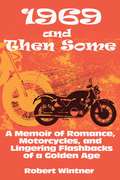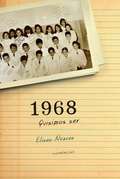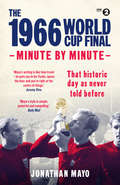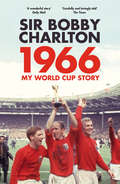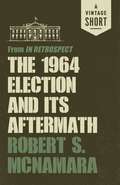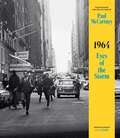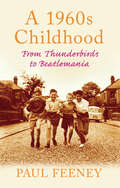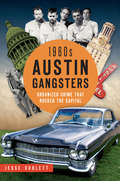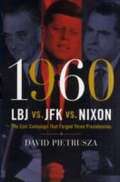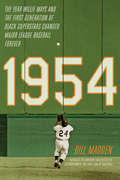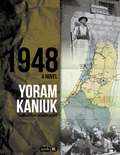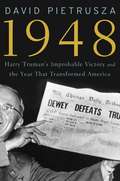- Table View
- List View
2/ Auckland, 1918;: Being A Partial Record Of The War Service In France Of The 2/ Auckland Regiment During The Great War [Illustrated Edition]
by Colonel Sir Stephen Shepherd Allen KBE CMG DSOIncludes the First World War Illustrations Pack - 73 battle plans and diagrams and 198 photosColonel Sir Stephen Allen recounts, with justified pride the history of the 2nd Battalion of the Auckland Regiment, 2/Auckland for short, during the last year of the war. The 2nd Battalion formed part of the New Zealand Division and had seen much action since arriving in France in 1916; at the Battles of the Somme, Fleubaix, Messines and at Third Ypres. However the signal services of the 2/Auckland in 1918 are fully deserving of this separate tome; during the German Spring Offensives they were thrown into the line to stem the enemy advance and were the first troops to make a morale raising counterattack at La Signy Farm. As the German Army started to crack in the summer of 1918, 2/Auckland where among the foremost pursuers; at Welsh Ridge, Le Quesnoy.
1999: Victory Without War
by Richard Nixon"Nixon raises all the timely questions about the present state of the world, and then answers them both systematically and thoroughly." --The New York TimesIn this acclaimed national bestseller, Richard Nixon offers a comprehensive strategy for the West--a vital plan of action that will help ensure peace, prosperity, and freedom in the next century. From glasnost and summitry to arms control and "Star Wars," from Nicaragua and China to Europe and Japan, he gives seasoned, no-nonsense advice on all tough foreign policy issues. The former President draws on a lifetime of experience in international affairs to examine the crucial challenges facing the United States and the West and how best to go forward in the 21st century.
1999
by Richard M. Nixon(back of book) As America's elder statesman of foreign relations, former president Richard Nixon provides a blueprint for world peace in 1999: VICTORY WITHOUT WAR. Drawing on a lifetime of experience, Nixon outlines the key international problems Western leaders must face as this century of "war and wonder" comes to a close-- and explains how the United States can meet these challenges to make the twenty-first a century of real peace. "A FOREIGN POLICY TOUR DE FORCE-A CRISP COGENT, CAUTIONARY TALE ABOUT AMERICA'S DIRECTION IN A TOPSY-TURVY WORLD ....IN UNCOMMONLY SENSIBLE LANGUAGE, THE MAN WHO OPENED CHINA TO THE WEST, WHO FORGED DETENTE WITH THE RUSSIANS. AND WHO NEGOTIATED THE FIRST NUCLEAR DISARMAMENT TREATY DEMONSTRATES WHY HE HAS EARNED THE TITLE OF AMERICAN ELDER STATESMAN.... AT HIS MOST ELOQUENT, NIXON ARGUES FOR AN AMERICA THAT REMEMBERS ITS IDEOLOGICAL EDGE, AN AMERICA THAT WILLINGLY AND CREATIVELY ACCEPTS THE BURDEN OF WORLD LEADER. NEVER HAS NIXON BEEN MORE FASCINATING, MORE FORTHRIGHT, MORE PERSUASIVE IN HIS THINKING ABOUT OUR POLITICAL AND MORAL IMPERATIVES!' -- The Columbus Dispatch printed in USA.
The 1997 Masters: My Story
by Lorne Rubenstein Tiger WoodsTo mark the twentieth anniversary of his historic win at the 1997 Masters, Tiger Woods will for the first time reflect on the record-setting win both on and off the course.In 1997, Tiger Woods was already among the most-watched and closely examined athletes in history. But it wasn't until the Masters Tournament that his career would definitively change forever. Woods, then only 21, won the Masters by a historic 12 shots, which remains the widest margin of victory in the tournament's history, making it an iconic moment for him and sports.Now, 20 years later, Woods is ready to explore his history with the game, how it has changed over the years, and what it was like winning such an important event. With never-before-heard stories, this book will provide keen insight from one of the game's all-time greats.
1990: Russians Remember a Turning Point
by Irina ProkhorovaAlthough 1989 and 1991 witnessed more spectacular events, 1990 was a year of embryonic change in Russia: Article 6 of the constitution was abolished, and with it the Party's monopoly on political power. This fascinating collection of documentary evidence crystalizes the aspirations of the Russian people in the days before Communism finally fell.It charts--among many other social developments--the appearance of new political parties and independent trade unions, the rapid evolution of mass media, the emergence of a new class of entrepreneurs, a new openness about sex and pornography and a sudden craze for hot-air ballooning, banned under the Communist regime.1990 is a reminder of the confusion and aspirations of the year before Communism finally collapsed in Russia, and a tantalizing glimpse of the paths that may have been taken if Yeltsin's coup had not forced the issue in 1991.
1989 the Berlin Wall: My Part in Its Downfall
by Peter MillarFollow Peter Millar on a journey in the heart of Cold War Europe, from the carousing bars of 1970s Fleet Street to the East Berlin corner pub with its eclectic cast of characters who embodied the reality of living on the wrong side of the wall.
1989 the Berlin Wall: My Part in Its Downfall
by Peter MillarFollow Peter Millar on a journey in the heart of Cold War Europe, from the carousing bars of 1970s Fleet Street to the East Berlin corner pub with its eclectic cast of characters who embodied the reality of living on the wrong side of the wall.
1984-George Orwell - Novel: १९८४-जॉर्ज ऑरवेलने - कादंबरी
by George Orwell‘१९८४’ हे पुस्तक अशाचपैकी एक आहे. जॉर्ज ऑरवेलने १९४८ साली हे पुस्तक लिहिले. भविष्यकाळातील सर्वंकष हुकूमशाहीचे चित्रण त्यात केले आहे. या पुस्तकाचा बोलबाला सर्व जगात जसा झाला, तसाच तो महाराष्ट्रातही झाला. ३६ सालात जगातील सुमारे ६२ भाषांत या पुस्तकाची भाषांतरे झाली. मराठीत मात्र मी या पुस्तकाचे केलेले भाषांतर प्रसिद्ध होण्यासाठी ३१ डिसेंबर १९८४ ही तारीख उजाडावी लागली. तेव्हा कुठे मराठी भाषा ही भाषांतराच्या यादीत ६३वी भाषा ठरली. त्या वेळी प्रकाशन समारंभाला श्री. ग. प्र. प्रधान (समाजवादी), श्री. ना. ग. गोरे (समाजवादी), श्री. प्रभाकर उर्ध्वरेषे (कम्युनिस्ट) इत्यादी राजकीय नेते उपस्थित होते. त्यांनी या पुस्तकाची मुक्त कंठाने स्तुती केली. १९८४ सालानंतर २७ वर्षांनी या पुस्तकाची दुसरी आवृत्ती बाजारात येत आहे. जॉर्ज ऑरवेलने म्हणतात की, आणीबाणीत अनेक प्रकाशकांना मी विचारले असता या पुस्तकाचे भाषांतर प्रसिद्ध करण्यास ते कचरले. त्यामागे भीती होती अन् ही भीती हीच हुकूमशहाची शक्ती असते. हुकूमशाही म्हणजे नेमके काय, हे ऑरवेलने यात दाखवले आहे. भीतीचा वापर केल्यावरही हुकूमशहाचे समाधान होत नाही. त्याला जनतेने स्वेच्छेने त्याच्यावर प्रेम करावे, त्याची भक्ती करावी असे वाटत असते. कोणतेही राजकीय तत्त्वज्ञान हा केवळ हुकूमशहा बनण्यासाठी घेतलेला आधार असतो. ‘खरी हुकूमशाही माणसाच्या रक्तातच असते काय?’ असा प्रश्न हे पुस्तक वाचल्यावर वाचकाला नक्की पडेल. तसेच हूकूमशाही अगदी टोकाला गेल्यावर काय काय घडू शकते, हे या पुस्तकात फार चांगले दर्शवले आहे.
1981 - Diario
by Patrick LoiseauIl 1981 fu un anno importante. Importante per me, perché ancora una volta mi liberavo dalle catene dimettendomi dal mio impiego e scrivendo, per mia figlia, che sarebbe nata di lì a poco, o perlomeno così speravo. Anche la Francia tentava di liberarsi dalle sue catene, o almeno la Francia popolare, quella che lavoro e si alza presto. In entrambi i casi, per me e i lavoratori, la posta in gioco era una scommessa sul futuro, la cui parola libertà non era il minimo dei concetti. Scommessa rischiosa. Per quanto mi riguarda, la scommessa era vinta in anticipo; da un lato perché sapevo che questo bambino sarebbe nato anche solo per onorare il papà-gallina rivoluzionario in moto che ero, d'altra parte perché all'inizio non avevo molta illusione su cosa sarebbe stato un governo di collaborazioni di classe..
1978. El año que marchamos a la guerra
by Guillermo ParvexEl mismo autor del exitoso Un veterano de tres guerras entrega este relato que cobra actualidad a 40 años de una guerra que no fue Mientras estudiaba Periodismo en la Universidad de Chile, Guillermo Parvex fue llamado por el Ejército para recibir instrucción militar específica y ser parte de las milicias chilenas que se dirigirían a la frontera con Argentina. Era 1978, Parvex tenía 24 años y la guerra con el país vecino era inminente. Este libro reconstruye la historia personal del autor durante los meses que estuvo en la frontera y el contexto histórico de esos difíciles años, un relato inédito en primera persona que nos habla de aquellos años convulsos en que se ocultaba la movilización de tropas hasta las regiones limítrofes que nos separan del país vecino. Reseña: "Un libro que reconstruye por primera vez la instrucción militar que recibieron en secreto miles de jóvenes chilenos."
The 1972 Munich Olympics and the Making of Modern Germany
by Christopher Young Kay SchillerThe 1972 Munich Olympics-remembered almost exclusively for the devastating terrorist attack on the Israeli team-were intended to showcase the New Germany and replace lingering memories of the Third Reich. That hope was all but obliterated in the early hours of September 5, when gun-wielding Palestinians murdered 11 members of the Israeli team. In the first cultural and political history of the Munich Olympics, Kay Schiller and Christopher Young set these Games into both the context of 1972 and the history of the modern Olympiad. Delving into newly available documents, Schiller and Young chronicle the impact of the Munich Games on West German society and deliver the first full account of one of the most significant moments in post-war German history.
1972: The Series That Changed Hockey Forever
by Scott MorrisonThe legacy of the greatest hockey series ever played, fifty years later, with stories from the players that shed new light on those incredible games and times.&“Cournoyer has it on that wing. Here&’s a shot. Henderson made a wild stab for it and fell. Here&’s another shot. Right in front...they score! Henderson has scored for Canada!&” These immortal words, spoken to hockey fans around the world by the legendary broadcaster Foster Hewitt, capture the historic final-seconds goal scored by Paul Henderson that won the 1972 Summit Series against the Soviet Union. Hockey fans know the moment well, but the story of those amazing eight games has never been fully told—until now. The series was the first of its kind, and one of the most dramatic sporting showdowns in history. With the Soviets dominating international hockey, this series was meant to settle the debate, once and for all, of who owned the game. It was Canada&’s best against the Soviets for the first time. And in the shadow of the Cold War, this was about more than eight games of hockey. Expectations were high as the series began. This was supposed to be easy for Team Canada, but after the disappointing first four games on home ice with only one win, victory seemed out of reach. With the final four games in Moscow, Canada got a rare glimpse behind the iron curtain as the team, as well as three thousand raucous fans, arrived in the USSR. Amid the culture shock and strained relations, what followed was a tug-of-war battle that lasted to the dying seconds of game 8. Now, five decades after this historic event, it&’s time to reflect on the greatest hockey series ever played. Veteran journalist and hockey analyst Scott Morrison uses a storyteller&’s voice to reveal what it meant to hockey then, and what it means now. Filled with the memories of the players and others involved with the series, he shows how it changed the game, and challenged a nation&’s sense of identity and place in the world.
1969 and Then Some: A Memoir of Romance, Motorcycles, and Lingering Flashbacks of a Golden Age
by Robert WintnerThe year when everything needed to be experienced and tried, when innocence was tempted, played, and lost.1969 was that pivotal year for the baby boomers. Young and innocent, they were given the ultimate freedoms and were faced with growing up.This touching, hilarious memoir is the true story of a late sixties grand tour of Europe-a life-defining parable, for those who remember and for those who can't. Never before and not since have a handful of seasons so exquisitely defined the difference between right and wrong. With the gift of youth they saw, sensed, and savored the laughably clear distinction between profit motive and greed, between truth and propaganda, between national interest and defense contractors, between a lovely cloud of smoke and the smoke of napalm, and between the phantoms of security and the dangers of complacency and atrophy.Stoned to the gills and then some, these adventurers saw and felt and knew things that no generation before did. Some fully engaged in the counterculture while others merely observed, sticking a left foot in, pulling a left foot out, but not quite jumping to the full hokeypokey.It was an incredible time of self-discovery, of love, and of finding out what you were made of.
1968. Quisimos ser
by Eliseo AlvarezEl periodista Eliseo Alvarez se propuso reunir a sus ex compañeros de laescuela que los vio crecer, la Número 11 de Villa Ballester. La vida decada unosintetiza la historia de los hijos de inmigrantes, de laescuela pública, de la transformación de los barrios y, en definitiva,de la Argentina. «El libro es un conmovedor y peligroso ejercicio de nostalgia. No creoque muchos se atrevan a remover de este modo su memoria. Se parece a unade esas mudanzas que hacemos al cambiar de residencia. Se abren cajones,armarios, maletas y cajas amontonadas en el desván y aparece eltumultuoso pasado y sus encabritadas criaturas olvidadas, impacientes yansiosas por encontrar de nuevo en tu cabeza un lugar en donde existir.Esta multitud habla de un mundo perdido pero impetuoso. Los personajeshablan, sonríen, se entristecen o celebran sus viejas ensoñaciones. Lahistoria es un gratificante fresco sobre la tormenta del tiempo: lo quefuimos, lo que somos, lo que recordamos, lo que perdimos... El relatonos invita a mirar atrás sin que Teseo ni la mujer de Lot cumplan suprofecía: mira atrás, vale, de acuerdo, pero sigue tu camino». BasilioBaltasar
The 1966 World Cup Final: Minute by Minute (Minute By Minute)
by Jonathan Mayo30th July 1966. For millions it was the greatest day of the greatest decade. They may never have seen the Beatles in the Cavern or danced at Woodstock, but they got to see the finest moment in English sporting history. Everything came together that sunny afternoon. The country was the centre of the world in fashion, film and music - so why shouldn't the World Cup be England's as well? This is the story of that extraordinary 24 hours, told through the eyes of the players, the fans on the terraces, and those watching and listening at home and abroad. Take the young policeman with the tricky task of swapping the real Jules Rimet trophy for a replica; the former German POW on holiday in Wales keeping his nationality secret as he watches the match in a stranger's house; and the Kent firecrew dousing a chimney fire as they watch the final on television. Full of fascinating details, this book evokes a period when football fans wore suits to matches, traffic policemen were invited into homes to watch the game, and the England squad could walk to the cinema undisturbed the evening before the biggest game of their lives.
The 1966 World Cup Final: Minute by Minute (Minute By Minute Ser.)
by Jonathan Mayo30th July 1966. For millions it was the greatest day of the greatest decade. They may never have seen the Beatles in the Cavern or danced at Woodstock, but they got to see the finest moment in English sporting history. Everything came together that sunny afternoon. The country was the centre of the world in fashion, film and music - so why shouldn't the World Cup be England's as well? This is the story of that extraordinary 24 hours, told through the eyes of the players, the fans on the terraces, and those watching and listening at home and abroad. Take the young policeman with the tricky task of swapping the real Jules Rimet trophy for a replica; the former German POW on holiday in Wales keeping his nationality secret as he watches the match in a stranger's house; and the Kent firecrew dousing a chimney fire as they watch the final on television. Full of fascinating details, this book evokes a period when football fans wore suits to matches, traffic policemen were invited into homes to watch the game, and the England squad could walk to the cinema undisturbed the evening before the biggest game of their lives.
1966: My World Cup Story
by Bobby CharltonWembley, 1966. England wins the World Cup to roars of a euphoric home crowd.Sir Bobby Charlton, England’s greatest ever player, was there on the pitch. In 1966, he looks back on the most glorious moment of his life and England's greatest sporting achievement.He takes us through the build-up to the tournament and to the final itself - what he saw, what he heard, what he felt. He tells us what it was like to be part of Sir Alf Ramsey’s team, his memories of his teammates, the matches, the atmosphere; the emotion of being carried on the wave of a nation’s euphoria and how it felt to go toe-to-toe with some of the foremost footballers to ever play the game.His life was forever defined by a single moment: one day when a man stood side-by-side with his best friends, united in a single aim in front of a watching nation. This is his story.‘It’s gripping stuff… This is a mellow book, the product of many years’ contemplation, and emotional in a way that may surprise you…He has a wonderful story to tell’ Daily Mail
The 1964 Election and Its Aftermath: from In Retrospect
by Robert Mcnamara"Can anyone remember a public official with the courage to confess error and explain where he and his country went wrong? This is what Robert McNamara does in this brave, honest, honorable, and altogether compelling book."—Arthur Schlesinger, Jr. Written twenty years after the end of the Vietnam War, former Secretary of Defense Robert McNamara's controversial memoir answers the lingering questions that surround this disastrous episode in American history, and chronicles the political events and fatal misassumptions that were behind the US involvement in Vietnam.A Vintage Shorts Vietnam Selection. An ebook short.
1964: Eyes of the Storm
by Paul McCartney“Millions of eyes were suddenly upon us, creating a picture I will never forget.” —Paul McCartney. <p><p>Taken with a 35mm camera by Paul McCartney, these largely unseen photographs capture the explosive period, from the end of 1963 through early 1964, in which The Beatles became an international sensation and changed the course of music history. <p><p>Featuring 275 images from the six cities—Liverpool, London, Paris, New York, Washington, D.C., and Miami—of these legendary months, 1964: Eyes of the Storm also includes: <p>• A personal foreword in which McCartney recalls the pandemonium of British concert halls, followed by the hysteria that greeted the band on its first American visit <p>• Candid recollections preceding each city portfolio that form an autobiographical account of the period McCartney remembers as the “Eyes of the Storm,” plus a coda with subsequent events in 1964 <p>• “Beatleland,” an essay by Harvard historian and New Yorker essayist Jill Lepore, describing how The Beatles became the first truly global mass culture phenomenon <p><p>Handsomely designed, 1964: Eyes of the Storm creates an intensely dramatic record of The Beatles’ first transatlantic trip, documenting the radical shift in youth culture that crystallized in 1964. <p><p>“You could hold your camera up to the world, in 1964. But what madness would you capture, what beauty, what joy, what fury?” —Jill Lepore <p> <b>New York Times Bestseller</b>
A 1960s Childhood: From Thunderbirds to Beatlemania
by Paul FeeneyDo you remember Beatlemania? Radio Caroline? Mods and Rockers? The very first miniskirts? Then the chances are you were born in the or around 1960.To the young people of today, the 1960s seems like another age. But for those who grew up in this decade, school life, 'mod' fashions and sixties pop music are still fresh in their minds. From James Bond to Sindy dolls and playing hopscotch in the street, life was very different to how it is now. After the tough and frugal years of the fifties, the sixties was a boom period, a time of changed attitudes and improved lifestyles. With chapters on home and school life, games and hobbies, music and fashion, alongside a selection of charming illustrations, this delightful compendium of memories will appeal to all who grew up in this lively era. Take a nostalgic look at what it was like to grow up during the sixties and recapture all aspects of life back then.
1960s Austin Gangsters: Organized Crime that Rocked the Capital (True Crime)
by Jesse SublettTimmy Overton of Austin and Jerry Ray James of Odessa were football stars who traded athletics for lives of crime. The original rebels without causes, nihilists with Cadillacs and Elvis hair, the Overton gang and their associates formed a ragtag white trash mafia that bedazzled Austin law enforcement for most of the 1960s. Tied into a loose network of crooked lawyers, pimps and used car dealers who became known as the "traveling criminals," they burglarized banks and ran smuggling and prostitution rings all over Texas. Author Jesse Sublett presents a detailed account of these Austin miscreants, who rose to folk hero status despite their violent criminal acts.
1960--LBJ vs. JFK vs. Nixon: The Epic Campaign That Forged Three Presidencies
by David PietruszaIt was the election that would ultimately give America "Camelot" and its tragic aftermath, a momentous contest when three giants who each would have a chance to shape the nation battled to win the presidency. Award-winning author David Pietrusza does here for the 1960 presidential race what he did in his previous book, 1920: the Year of the Six Presidents--which Kirkus Reviews selected as one of their Best Books of 2007. Until now, the most authoritative study of the 1960 election was Theodore White's Pulitzer Prize-winning The Making of the President, 1960. But White, as a trusted insider, didn't tell all. Here's the rest of the story, what White could never have known, nor revealed. Finally, it's all out--including JFK's poignant comment on why LBJ's nomination as vice president would be inconsequential: "I'm 43 years old. I'm not going to die in office. " Combining an engaging narrative with exhaustive research, Pietrusza chronicles the pivotal election of 1960, in which issues of civil rights and religion (Kennedy was only the second major-party Roman Catholic candidate ever) converged. The volatile primary clash between Senate Majority leader LBJ and the young JFK culminated in an improbable fusion ticket. The historic, legendary Kennedy-Nixon debates followed in its wake. The first presidential televised debates, they forever altered American politics when an exhausted Nixon was unkempt and tentative in their first showdown. With 80 million viewers passing judgment, Nixon's poll numbers dropped as the charismatic Kennedy's star rose. Nixon learned his lesson--resting before subsequent debates, reluctantly wearing makeup, and challenging JFK with a more aggressive stance--but the damage was done. There's no one better to convey the drama of that tumultuous year than Pietrusza. He has 1,000 secrets to spill; a fascinating cast of characters to introduce (including a rogue's gallery of hangers-on and manipulators); and towering historical events to chronicle. And all of it is built on painstaking research and solid historical scholarship. Pietrusza tracks down every lead to create a winning, engaging, and very readable account. With the 2008 elections approaching, politics will be on everyone's mind, and 1960: LBJ vs. JFK vs. Nixon will transform the way readers see modern American history. A sampling of what Theodore White couldn't chronicle--and David Pietrusza does: · Richard Nixon's tempestuous Iowa backseat blowup, and his bizarre Election Day road trip · The full story of a sympathetic call from JFK to Coretta Scott King · John Ehrlichman's spy missions on the Nelson Rockefeller and Democratic camps · The warnings before Election Day that Chicago's mayor Daley would try to fix the race's outcome · JFK's amphetamine-fueled debate performance
1954: The Year Willie Mays and the First Generation of Black Superstars Changed Major League Baseball Forever
by Bill Madden1954: Perhaps no single baseball season has so profoundly changed the game forever. In that year#151;the same in which the US Supreme Court unanimously ruled, in the case of Brown vs. Board of Education, that segregation of the races be outlawed in America's public schools#151;Larry Doby's Indians won an American League record 111 games, dethroned the five-straight World Series champion Yankees, and went on to play Willie Mays's Giants in the first World Series that featured players of color on both teams. Seven years after Jackie Robinson had broken the baseball color line, 1954 was a triumphant watershed season for black players#151;and, in a larger sense, for baseball and the country as a whole. While Doby was the dominant player in the American League, Mays emerged as the preeminent player in the National League, with a flair and boyish innocence that all fans, black and white, quickly came to embrace. Mays was almost instantly beloved in 1954, much of that due to how seemingly easy it was for him to live up to the effusive buildup from his Giants manager, Leo Durocher, a man more widely known for his ferocious "nice guys finish last" attitude. Award-winning, New York Times bestselling author Bill Madden delivers the first major book to fully examine the 1954 baseball season, drawn largely from exclusive recent interviews with the major players themselves, including Mays and Doby as well as New York baseball legends from that era: Yogi Berra and Whitey Ford of the Yankees, Monte Irvin of the Giants, and Carl Erskine of the Dodgers. 1954 transports readers across the baseball landscape of the time#151;from the spring training camps in Florida and Arizona to baseball cities including New York, Baltimore, Chicago, and Cleveland#151;as future superstars such as Hank Aaron, Ernie Banks, and others entered the leagues and continued to integrate the sport. Weaving together the narrative of one of baseball's greatest seasons with the racially charged events of that year, 1954 demonstrates how our national pastime#151;with the notable exception of the Yankees, who represented "white supremacy" in the game#151;was actually ahead of the curve in terms of the acceptance of black Americans, while the nation at large continued to struggle with tolerance.
1948
by Yoram Kaniuk Anthony BerrisSixty years after fighting in Israel's War of Independence, Yoram Kaniuk tries to remember what exactly did--and did not--happen in his time as a teenage soldier in the Palmach. The result is a touchingly poignant and hauntingly beautiful memoir that the author himself considers a work of fiction, for what is memory but one's own story about the past? Eschewing self-righteousness in favor of self-criticism, Kaniuk's book, winner of the 2010 Sapir Prize for Literature, is the tale of a younger man told by his older, wiser self--the self who realizes that wars are pointless, and that he and his friends, young men from good homes forming an offbeat band of brothers, were senseless to see glory in the prospect of dying young. But it is also a painful, shocking, and tragically relevant homage to the importance of bearing witness to the follies of the past, even--or especially--when they are one's own.
1948: Harry Truman's Improbable Victory and the Year that Transformed America
by David PietruszaThe behind-the-headline true story of Harry Truman's stunning upset! Everyone knows the iconic news photo of jubilant underdog Harry Truman brandishing a copy of the Chicago Tribune proclaiming "DEWEY DEFEATS TRUMAN. " David Pietrusza goes backstage to explain how it happened, placing the brutal political battle in the context of an erupting Cold War and America's exploding storms over civil rights and domestic communism. Pietrusza achieves for 1948's presidential race what he previously did in his acclaimed 1960--LBJ vs. JFK vs. Nixon: bringing history to life and intrigue readers with tales of high drama while simultaneously presenting the issues, personalities, and controversies of this pivotal era with laser-like clarity.
